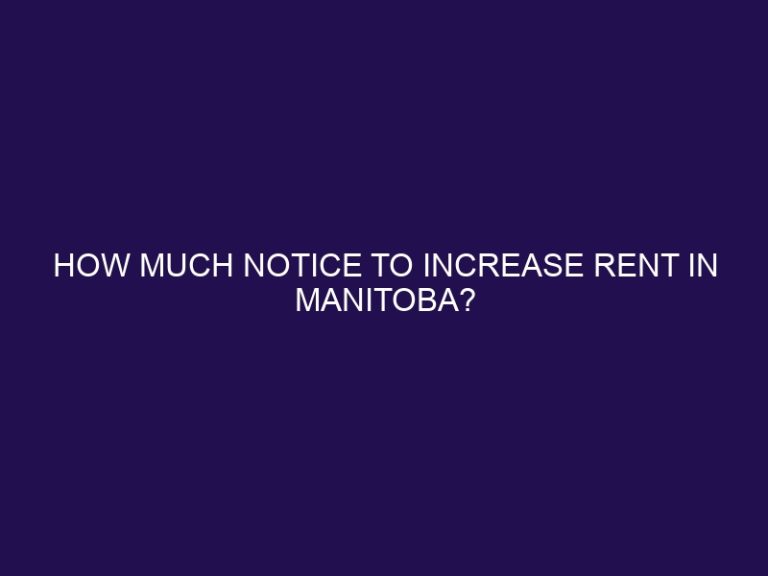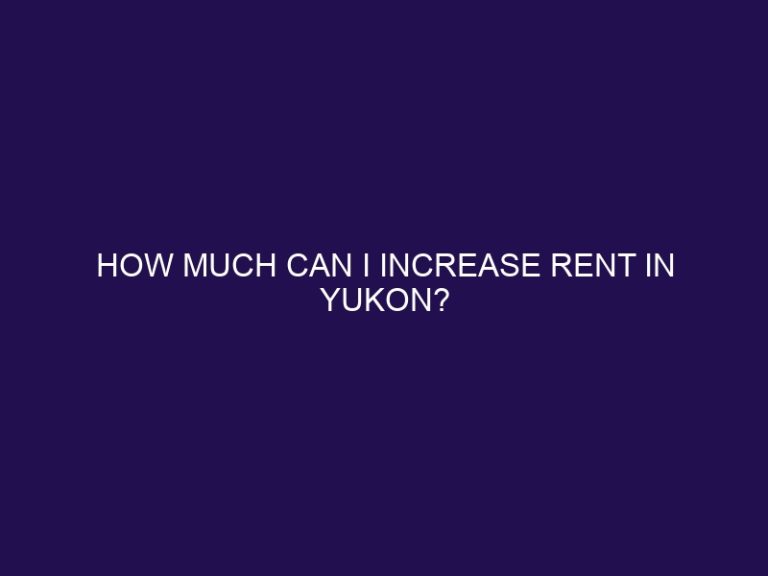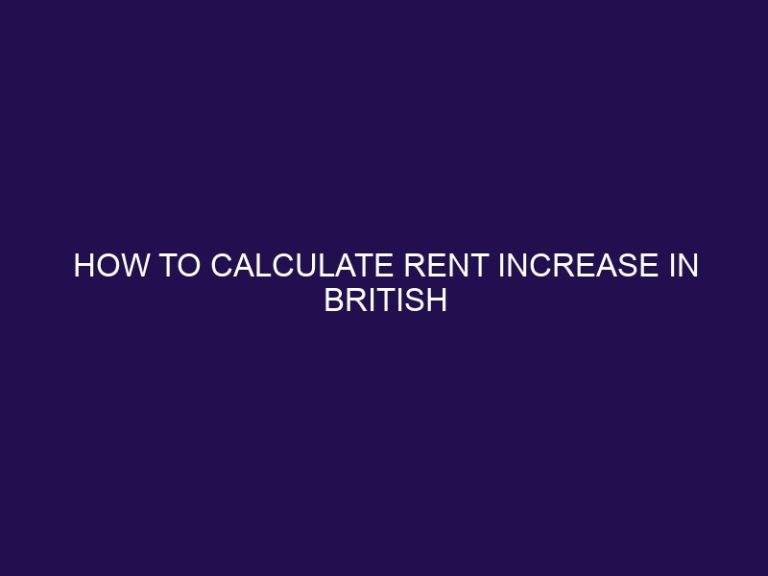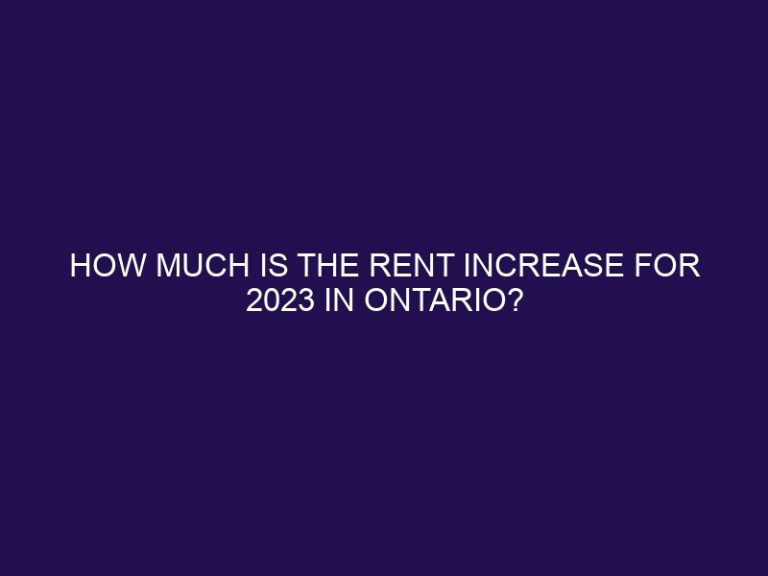How much can I increase rent in Manitoba?
.jpg)
Understanding Rent Increase in Manitoba
Rent increase is a significant aspect of being a landlord or a tenant in Manitoba. It is essential to have a clear understanding of the rules and regulations surrounding rent increases to ensure a fair and legal process.
In Manitoba, there are specific guidelines and regulations in place to govern rent increases. These guidelines aim to strike a balance between protecting the rights and interests of tenants while allowing landlords to make necessary adjustments to rental rates.
To ensure compliance with the law, landlords must be aware of the maximum allowable rent increase percentage set by the Residential Tenancies Branch. This percentage varies annually and is determined based on economic factors and market conditions.
Factors such as market conditions, maintenance and upgrades, and financial considerations should also be taken into account when considering a rent increase. Understanding and considering these factors can help ensure that any adjustments in rent are fair and justifiable.
When notifying tenants about a rent increase, landlords must follow the correct procedure outlined by the Residential Tenancies Branch. This includes adhering to the specified notice period and providing all necessary information in the rent increase notice.
It is important for tenants to be aware of their rights regarding rent increases. Tenants have the right to challenge a rent increase if they believe it to be unfair or unlawful. There is a specific process in place for tenants to follow when challenging a rent increase, ensuring that their concerns are addressed.
By understanding the rules and regulations surrounding rent increases in Manitoba, both landlords and tenants can navigate this aspect of the rental market with clarity and confidence.
Key takeaway:
- Rent increase guidelines in Manitoba: There are specific rules and regulations to follow when increasing rent in Manitoba. Landlords must be aware of the maximum allowable rent increase percentage set by the government.
- Factors influencing rent increase: Market conditions, maintenance and upgrades, and financial considerations are important factors to consider when determining the amount of rent increase. Landlords should assess these factors before raising rent.
- Tenant rights and challenging rent increase: Tenants have rights regarding rent increase. They can challenge a rent increase if they believe it is unjustified. There is a process in place for tenants to follow when disputing a rent increase in Manitoba.
Understanding Rent Increase in Manitoba
In Manitoba, it is crucial for both landlords and tenants to understand the specific rules and regulations governing rent increase. The Rent Increase Guideline set by the provincial government determines the maximum allowable increase, taking into account factors such as inflation, operating costs, and market conditions. Rent can only be increased once every 12 months in this province. To accurately and up-to-date information on rent increases in Manitoba, it is important to consult the Residential Tenancies Branch and be aware of your rights as a tenant or landlord. Before implementing a rent increase, make sure to provide proper notice to your tenant(s) and familiarize yourself with all the legal requirements to avoid any potential disputes.
What Are the Rules and Regulations for Rent Increase in Manitoba?
What Are the Rules and Regulations for Rent Increase in Manitoba?
When it comes to increasing rent in Manitoba, landlords must follow certain rules and regulations. The Residential Tenancies Act states that landlords can only raise the rent once every 12 months. Furthermore, they are required to provide tenants with a written notice at least three months before the rent increase takes effect. It’s important to note that the government sets a guideline for the maximum rent increase, which for 2021 stands at 1.6%.
Landlords must ensure that any rent increase they implement is fair and reasonable. This means staying within the government’s guidelines and considering the overall affordability for the tenants. It’s vital for both landlords and tenants to familiarize themselves with these rules and regulations to ensure a smooth and legal rental process.
For landlords in Manitoba seeking suggestions on how to navigate rent increases effectively, here are some tips to consider:
| 1. Stay informed about the latest guidelines established by the government for rent increases. |
| 2. Plan ahead and provide tenants with the necessary written notice at least three months prior to the rent increase. |
| 3. Make sure that any rent increase remains within the specified guidelines and is reasonable and fair. |
| 4. Establish open lines of communication with tenants and address any concerns they might have regarding the rent increase. |
By following these suggestions and adhering to the rules and regulations, landlords can navigate rent increases in Manitoba in a fair and legal manner.
Are There Any Specific Guidelines for Rent Increases?
In Manitoba, there are specific guidelines for rent increases that landlords must adhere to. The maximum allowable rent increase percentage is determined by the Residential Tenancies Branch and is typically announced annually. For 2023, the maximum allowable increase is set at 1.6%. Landlords must also consider other factors when increasing rent, such as market conditions, maintenance and upgrades, and their own financial considerations. When informing tenants about a rent increase, landlords must provide proper notice, which is typically three months before the increase takes effect. Tenants have the right to challenge a rent increase if they believe it violates the guidelines set by the Residential Tenancies Act.
Are There Any Specific Guidelines for Rent Increases?
Sarah, a tenant in Manitoba, received a notice of a rent increase from her landlord. Concerned about her budget, she researched the specific guidelines for rent increases and discovered that the maximum allowable increase for the year was 1.6%. Realizing that the proposed increase was higher than the permitted percentage, Sarah decided to challenge the rent increase. She contacted the Residential Tenancies Branch and followed the necessary steps to file a challenge. As a result, the rent increase was deemed unlawful, and Sarah’s rent remained unchanged. This story showcases the importance of understanding and exercising tenants’ rights when it comes to rent increases in Manitoba.
What Is the Maximum Allowable Rent Increase Percentage?
The maximum allowable rent increase percentage in Manitoba is determined by the Residential Tenancies Branch. For the year 2022, the maximum allowable rent increase is set at 1.6%. It is important to note that this percentage can change annually. Landlords must provide tenants with written notice of any rent increases at least three months before the increase takes effect. This notice must include the date the increase will take effect, the new rental amount, and the tenant’s right to challenge the increase. It is crucial for landlords to follow these guidelines to ensure compliance with Manitoba’s rental regulations.
Factors to Consider When Increasing Rent in Manitoba
When it comes to increasing rent in Manitoba, there are several key factors to consider. In this section, we’ll take a look at these important considerations that can impact the decision to raise rent. From the current market conditions to the necessary maintenance and upgrades, as well as the financial implications, we’ll dive into each sub-section to provide valuable insights for landlords and tenants alike. So, let’s explore the factors that play a crucial role in determining rent increments in Manitoba.
1. Market Conditions
Market conditions play a crucial role in determining the strategy for rent increases in Manitoba. Landlords must consider factors such as vacancy rates, demand for rental units, and local economic conditions. By analyzing the current market conditions, landlords can make informed decisions about adjusting rental prices. For example, if the vacancy rates are low and demand is high, landlords may have more leeway to increase rents. On the other hand, if the market is oversaturated and demand is low, landlords may need to be more cautious in raising rent to avoid losing tenants. It’s important to stay up-to-date on market trends to make well-informed decisions.
2. Maintenance and Upgrades
Maintenance and upgrades are important factors to consider when determining rent increases in Manitoba. Landlords need to ensure that the property is well-maintained and meets the required standards. Here are some key points:
- Regular maintenance: Regular maintenance of the property, such as fixing plumbing issues or repairing appliances, is necessary to provide a comfortable living environment for tenants.
- Property upgrades: Improving the property by adding amenities or upgrading features, such as installing energy-efficient appliances or renovating common areas, can justify a rent increase.
- Costs of maintenance and upgrades: Landlords should take into account the costs associated with maintenance and upgrades when determining the amount of the rent increase.
- Effective communication: It is important to effectively communicate with tenants about any planned maintenance or upgrades and how it may impact the rent. This allows tenants to plan their budget accordingly.
3. Financial Considerations
Here are three crucial factors to consider when determining a rent increase in Manitoba, with a focus on financial considerations.
1. Market Conditions: It is essential to analyze the current rental market and ensure that your proposed increase aligns with the prevailing rates in the area.
2. Maintenance and Upgrades: Take into account any recent property improvements you have made, as these investments can justify a higher rent increase to cover the costs.
Evaluate your overall financial situation, including expenses like property taxes, insurance, and mortgage payments. It’s important to ensure that the proposed increase sufficiently covers these costs and provides a reasonable return on investment.
Please refer to the table below for a summary of the factors to consider:
| Factors to Consider | Details |
| Market Conditions | Study rental market rates in the area. |
| Maintenance and Upgrades | Evaluate recent property improvements. |
| Financial Considerations | Analyze expenses and seek a reasonable ROI. |
How to Inform Tenants About Rent Increase
- Informing tenants about rent increases is an important process that should be handled carefully and considerately. Here is a step-by-step guide on how to inform tenants about a rent increase:
- Review the lease agreement to determine if there are any specific guidelines for rent increases.
- Check local laws and regulations regarding rent increases to ensure compliance.
- Prepare a written notice informing tenants of the upcoming rent increase.
- Include the effective date of the rent increase and the new rental amount in the notice.
- Give tenants a reasonable amount of advance notice, typically 30 to 60 days before the increase takes effect.
- Deliver the notice to tenants in person, by mail, or through email, depending on your communication method.
- Provide an opportunity for tenants to ask questions or discuss the rent increase if they have concerns.
What Is the Notice Period for Rent Increase?
In Manitoba, landlords must provide tenants with written notice of a rent increase at least three months before the increase takes effect. This notice period allows tenants to plan for the upcoming change in their housing expenses. The notice must be given in writing and include the specific details of the rent increase, such as the new rental amount and the date it will take effect. What Is the Notice Period for Rent Increase? It is important for landlords to follow this notice period to ensure compliance with the rules and regulations governing rent increases in Manitoba. By providing proper notice, landlords can maintain positive relationships with their tenants and avoid any legal issues.
What Information Should be Included in the Rent Increase Notice?
What Information Should be Included in the Rent Increase Notice?
The rent increase notice in Manitoba should include important information to inform tenants about the upcoming change. This includes the effective date of the rent increase, the new rental amount, and the reason for the increase. It is crucial to include details about the tenant’s right to challenge the rent increase and the process for doing so. Providing clear and transparent information in the notice can help maintain good tenant-landlord relationships and ensure compliance with regulations.
What Are the Rights of Tenants Regarding Rent Increase?
Tenants in Manitoba are entitled to certain rights when it comes to rent increases. What Are the Rights of Tenants Regarding Rent Increase? Landlords are required to provide written notice at least three months in advance before raising the rent. Moreover, the increase cannot surpass the annual guideline established by the government, typically around 2%. However, landlords can request an additional increase if they can demonstrate extraordinary expenses. If tenants believe the increase is unjust, they have the right to challenge it. It is crucial for tenants to be aware of their rights and consult the Residential Tenancies Branch if they have any concerns. Keeping a record of all communication with the landlord can be helpful in case of disputes.
Can Tenants Challenge a Rent Increase?
Can tenants challenge a rent increase? Absolutely! In Manitoba, tenants have the right to dispute a rent increase if they feel it is unfair or unreasonable. The Residential Tenancies Branch provides an avenue for tenants to challenge a rent increase by allowing them to request a hearing. Within 60 days of receiving the notice, tenants can present evidence to support their argument against the increase. If the Branch finds that the increase is unwarranted, they have the authority to reduce or even cancel the rent increase entirely. It is crucial for tenants to familiarize themselves with the rules and regulations regarding rent increases in order to safeguard their rights and ensure a just resolution.
What Is the Process of Challenging a Rent Increase?
Challenging a rent increase in Manitoba involves following a specific process to protect the rights of tenants. Here is an outline of the steps to consider in order to challenge the rent increase:
- Familiarize yourself with the rules and regulations regarding rent increases in Manitoba.
- Evaluate the notice received for the rent increase and ensure it complies with the legal requirements.
- Review the reasons provided for the increase and determine if they are valid.
- Gather evidence to support your case, such as proof of maintenance issues or unfair treatment.
- Contact the Residential Tenancies Branch to discuss the situation and seek guidance about the process of challenging a rent increase.
- File a dispute with the branch if you believe the rent increase is unjustified.
- Attend the hearing and present your case, providing any supporting documentation.
- Wait for the decision from the branch, which may include adjusting the rent increase or denying it altogether.
- Comply with the decision made by the branch and adjust your rent payments accordingly.
By following these steps, tenants can effectively challenge a rent increase in Manitoba while ensuring that their rights are protected.
Some Facts About How Much Can I Increase Rent in Manitoba:
- ✅ The Residential Tenancies Branch has set the rent increase guideline for 2024 at three percent, effective January 1, 2024. (Source: Our Team)
- ✅ Landlords must provide tenants with written notice at least three months in advance of a rent increase, following the requirements of The Residential Tenancies Act. (Source: Our Team)
- ✅ Rents can only be increased once per year in most cases. (Source: Our Team)
- ✅ Some units are exempt from the annual rent increase guideline, including units renting for $1,615.00 or more per month, various types of social housing, and rental units owned and operated by provincial, municipal, or federal governments. (Source: Our Team)
- ✅ Landlords have the option to apply for a larger rent increase if they can demonstrate that the guideline amount will not cover the cost increases they have incurred. (Source: Our Team)
Frequently Asked Questions
How much can I increase rent in Manitoba?
According to the Residential Tenancies Branch, the rent increase guideline for 2024 in Manitoba is set at three percent. Landlords must provide tenants with written notice at least three months in advance of a rent increase.
Are there any exceptions to the rent increase guideline in Manitoba?
Yes, there are some units that are exempt from the annual rent increase guideline. These include units renting for $1,615.00 or more per month, various types of social housing, rental units owned and operated by provincial, municipal, or federal governments, rental units in buildings first occupied after March 2005, not-for-profit life lease units, cooperative units, and approved rehabilitated rental units.
Can landlords apply for rent increases above the guideline amount?
Yes, landlords have the option to apply for a larger rent increase if they can demonstrate that the guideline amount will not cover the cost increases they have incurred. However, they must follow the proper written notice requirements outlined in The Residential Tenancies Act.
How often can landlords increase rent in Manitoba?
In most cases, rents can only be increased once per year in Manitoba. Landlords must provide tenants with written notice at least three months in advance of the rent increase, following the requirements of The Residential Tenancies Act.
How are the rent increase guidelines calculated?
The rent increase guideline for Manitoba is determined using a transparent method outlined in the Residential Rent Regulation. It is based on the percentage change in the average annual “All-Items” seasonally adjusted Consumer Price Index data published by Statistics Canada for Manitoba.
Can tenants challenge above-guideline rent increases in Manitoba?
Yes, tenants have the right to challenge above-guideline rent increases. However, the process is lengthy and there is no guarantee of a decision. It is advisable for tenants to seek legal advice and gather evidence to support their case if they wish to challenge an above-guideline increase.







